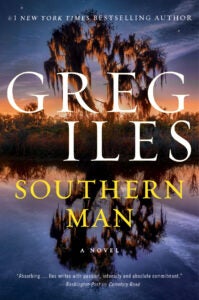By Tom Mayer
Mark Twain’s authorial axiom, “write what you know,” was written for Mississippi author Greg Iles. In the vein of life imitating art, there is no more clear connection than Iles’s Penn Cage series of novels. The author has long noted that Penn is modeled after himself, Penn’s father, a doctor, after his own and so on throughout the literary family.
But after dropping a revelatory letter about his health to his readers earlier in the year, the author’s connection between literature and life have, in “Southern Man”

(William Morrow), become even more personal — even as the series becomes more entrenched in a fictional realm that takes readers on a journey that began in 1999 with “The Quiet Game.”
The author tells us this himself: “You might be interested to know that as I wrote ‘Southern Man,’ the connection that always existed between Penn Cage and myself became even deeper, to the point that Penn took on my own secret struggle with mortality, along with the existential and political themes of this novel,” Iles writes in that letter.
But there is more. Not only has Iles crafted an intricately written behemoth of a book — the novel comes in at 950- plus pages — he advances Twain’s aphorism to include not only “write what you know” but “write what you predict you will know.” While no easy feat for any author, for a novelist to devise a contemporary and prescient political thriller within those standards that carries water at the time of publication is a masterstroke from a master writer. This is Greg Iles and that work is “Southern Man.”
About two weeks before the May 28 publication of Iles’s seventh full-length Penn Cage novel, the author graciously agreed to an interview about his new work, his health and the state of our nation — among other things. And as you’ll read, those things include not only more than one reference to other literary heavyweights, but the rock band Rock Bottom Remainders, a new addition to the Iles’s family, the question of another Penn Cage novel and the current state of Iles’s mental outlook — and for a hint on that, note that he named his abbreviated book events for “Southern Man” the “NOT YET DEAD Tour!”
Because his health prevented a one-on-one interview, Iles responded in writing to my questions. The following interview has been edited for clarity and length.
Tom Mayer: “Southern Man” is your most expansive, encompassing and engrossing Penn Cage story to date, but more, it’s eerily prophetic in terms of today’s political climate. You’ve said the novel was years in the writing, but you nail the impending presidential election season as if you wrote the book a month ago. Did things actually play out pretty much as you expected post-2020, or were you surprised by anything? Or to ask in another way, how much furious additions/deletions to the writing were there on the homestretch?
Greg Iles: You definitely nailed the panic of the last six weeks before I let go of this manuscript. Making political predictions in such a short timeframe is a very dangerous game, with the potential to look very stupid if you go far wrong. Also, I had basically doubled the pressure on myself by doing something I’d never done before in my career, which was to throw away an entire first draft after two years of work and start again. I usually publish my first drafts, primarily because of my secret illness, which I believe we’re going to get into later. Let me say upfront that I’m a proud Southerner in many ways. But I am not a Trump supporter. So, between my health crisis and trying to thread a fictional narrative into th unprecedented political reality we’ve all been living through, this has been the toughest book I’ve ever had to complete.
TM: Not every author has had the compunction, integrity and courage to write about the contemporary issues that need to be written about. But you’ve never shied away from saying what needs to be said, whether in one of your stand-alones, or certainly not in the seven Penn Cage novels. James Lee Burke is a kindred spirit in this way, but I’m seeing others who already claim a seat on that national stage. Fellow Mississippian John Grisham has been building his case on the death penalty and imprisonment for years, and his upcoming book, “Framed,” will be a case in point. And Don Winslow, who has announced his retirement from writing to attend to his passion, political activism, certainly made his views clear in his Danny Ryan trilogy. Would you comment on all of this?
GI: I think you’ve made a good list of writers who’ve shown courage during a period where there is a lot of resistance to brutal honesty on the page. In my opinion, James Lee Burke did a wonderful job of cross-racial narration in his recent “Flags on the Bayou,” and I was very gratified to see him win the Edgar for Best Novel for that work. I did the same thing in small portions of “Southern Man,” but I also stopped myself from overstepping the boundary in important ways, I think. No matter how well we know our native South or the people in it, there are some things we simply cannot know without experiencing them ourselves. For this reason, I also took a pretty hard shot at William Styron, a Southern writer who was revered when I came through college, but who I think committed some of the worst literary sins of projection, etc. in his “The Confessions of Nat Turner.” John Grisham gave me a great blurb the other day, and he was brave even in doing that, saying that in “Southern Man” I had taken “an unflinching look at the frightening rise of fascism and Trumpism.” John has always been a great advocate for many causes. I have always tried to be fearless, if not reckless, when dealing with the themes of my various novels. Not everybody appreciates that, but my favorite readers certainly do.
TM: Back to prophecy: The idea of a third-party candidate rising from the ashes of social media, aka Bobby White in “Southern Man,” is one that millions of Americans wish would happen today. I say the “idea” here because, without pushing out any spoilers, we can say that a player such as Bobby wouldn’t be, perhaps, our first choice. But was the idea of a supersized-H. Ross Perot one that you believed (believe) a viable alternative to our current choices?
GI: I’ll tell you, Tom, without giving too many spoilers, I look at Bobby White as a sort of Rorschach on the character of each reader. I have a pretty strong belief that if Robert E. Lee White were to appear on the ticket tomorrow, he might easily take this election by a double- digit percentage. As for political prediction, I think the award for that, unquestionably, goes to my bandmate [of the Rock Bottom Remainders] Stephen King for the creation of Greg Stillson in “The Dead Zone” decades ago.
TM: Along dissimilar lines … Penn has always been a champion of the people. I mean, look what he did in going head-to-head with the likes of billionaire Charles Dufort — and by the way, you do a great job with this and other exposition in either reminding consistent readers or informing those new to the series of the extensive backstories the series has evolved — but does it take the likes of a Penn Cage with his street smarts, education, contacts and resources to stand up to a political bully? That is, what can the average Joe or Jane do to fight the good fight?
GI: One, realize what is truly at stake in this unique election year. Two, vote accordingly, regardless of one’s political affiliation. Given the impending loss of white demographic power in America, we were always going to be facing a sort of “last white hope” of somehow maintaining white power in the face of that change. But what has been revealed since 2016 has truly stunned me, which is that tens of millions of Americans are willing to give up democracy and betray the Constitution in order to maintain that power. I don’t think they fully grasp what the consequences of that could be if whichever authoritarian leader seizes power were not on their side.
As for the hypothetical part of your question, it’s an inflexible principle of drama that one’s antagonist must be at least as strong as one’s protagonist, and I often prefer that the antagonist be the stronger of the two.
Usually, they are, if only by their willingness to break any rule or law in order to win. So, does it take a sort of superhuman character to defeat a Bobby White? On the page it does. In the real world, thankfully, it only takes an election — if the participants agree to honor its outcome.
TM: Speaking of the good fight, Penn Cage’s adult daughter in the series, Annie, is really coming into her own as a civil rights attorney. If “Southern Man” were a movie — which it is no doubt destined to be — she’d be a scene stealer every time. The relationship is built on tragedy, but there’s an enviable father-daughter dynamic at work here, especially as they join forces to fight an almost pure evil in this new novel. Only one other contemporary author I’m aware of — Michael Connelly in his continuing Bosch series — comes close. I’m wondering, what are the writing roots of the Penn and Annie relationship?
GI: Like so many aspects of the Cage family, as they’ve evolved in what’s become this long-running series, Annie has her roots in reality. My own daughter, who is 30 years old, is now practicing law in Jackson, Mississippi, and some of the cases she has already worked are pretty horrific. I worry a lot about the things she has seen and the dangers she could face doing that kind of work. But it certainly gives me a very clear and intimate lens through which to view crime in Mississippi. So much of the earlier Cage stuff I experienced through my father, the inspiration for Tom Cage. But he’s been dead 14 years now, so new sources of accurate insight are most welcome.
TM: On the topic of relationships … also enviable is the connection you have with your readers. Earlier this year, you wrote a letter about your illness. You’ve kept that quiet for a long time, but now you’ve not only addressed the elephant in the room, you’ve fed it a bag of peanuts and took it for a ride. Not every author is so forthcoming about his or her private life — a well-known author I once interviewed about a memoir he co-wrote with his brother reminded me he “only shows the reader what he wants them to see” — but you expand on this in spades in “Southern Man.” First, how difficult was the decision to give Penn (and his mother, Peggy) a similar, incurable blood cancer diagnosis? And, two, you’ve written that by the time “Southern Man” is published (May 28) you will have had a stem cell transplant. If you’re willing to share, I know that millions of us readers really care to know how you’re doing?
GI: Actually, Tom, I had to watch my mother die of multiple myeloma — the same cancer I have — while I was writing the initial draft of this book. Ironically, I was diagnosed more than 20 years (with the same disease) before she was, an almost unheard-of situation with what has always been classified as an incurable cancer.
Thankfully, Mom passed on before we realized that my own myeloma had “switched on” and nearly killed me before we understood what was happening. These events were so enormous in the lives of our family that I doubt I could have kept them out of this epic novel, which might be the end of the Cage saga. Penn has always been partly based on me, and that, I think, placed an extra burden of honesty on me as a writer. It was that, along with the present political danger, that prompted me to do something that few series writers ever do, which is to age their protagonist realistically on the page and make him or her truly mortal. Only this allowed me to leap 15 years ahead of where the Natchez Burning Trilogy ended and force Penn to confront the same lethal challenge that I am in my own life.
TM: Thank you for sharing that honesty, Greg. One piece of great news recently was the announcement that you would give a reading — not a signing — May 28 at Cathead Distillery in Jackson, Mississippi, and then at a couple of venues after that. I’ve no doubt that, given the timing of your health situation, that was no easy commitment to make. What did doing this first book launch event mean to you?
GI: It meant a great deal, Tom, in many ways. Just over two years ago, I confronted a serious dilemma upon being “re-diagnosed.” The oncologists were ready to transplant me as soon as they could, but I was bent on finishing “Southern Man” before enduring that procedure and the risks that come with it. I estimated that I could finish the book in six to eight weeks, but in the end it took more than two years. And all that time I was taking chemotherapy to keep my cancer under control. That has undoubtedly made it more difficult to get me into a position where we’re ready for harvest and transplant.
Was that worth it? There’s probably no way to know. The launch party at Cathead represents stepping out of the hermit-like isolation it always takes me to finish one of these big books. Seeing a lot of Mississippi readers and friends from the book industry was a wonderful experience. (As was the) freezing shot of Cathead vodka. But I will not be doing my usual extensive tour, so this also marks the end of my battle to finish this book and the new one against my cancer. I’d call that a big day.
TM: Let me finish with this, then. It seemed another “big day” was something you captured on video, with your brother, of your unboxing of the finished copy of “Southern Man.” You look like a kid on Christmas in your post at https:// www.facebook.com/GregIlesAuthor/. Last question, what does the publication of this novel mean to you and to your career?
GI: Well, this is my 18th novel, Tom. If you had asked me back when I was writing “Spandau Phoenix” in 1990 how many books I would write or get to publish, I’d never have said 18. So to reach this point, having been diagnosed with myeloma — considered a death sentence at the time — while writing my third novel, it’s pretty amazing. I think that explains the excitement people saw in me and my brother the other night. One thing my illness has taught us is just how many people are caught up in the same kind of battle that we are; many of them with fewer allies or resources than we have. But I think none of us has any greater resource than the will to survive. We’re doing all we can over at the Iles house to maintain some sense of normalcy, despite extraordinary circumstances. The best thing, believe it or not, is that my wife and I have a brand new daughter who is not quite 3 months old, and she is sleeping right here beside me while I answer your questions. In the same way that you asked what we can do to battle great danger or evil, I think we must do all we can in the face of severe illness and possible death. We cling to life, and put all our energy in that direction. As Steve wrote in the novella that became “The Shawshank Redemption”: “Get busy livin’, or get busy dyin’.”








